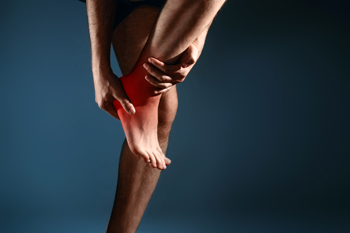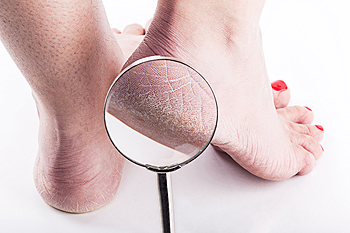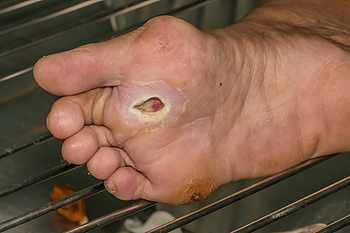 Patients who have chronic pain from specific foot conditions may be interested in learning about a treatment that is known as MLS laser therapy. It is defined as using wavelengths of light to possibly treat joint conditions, and injuries that have occurred to the tendons and ligaments. Additionally, it may help to reduce inflammation. After several treatments of approximately eight minutes each, swelling and pain may be diminished. Research has indicated the benefits of using MLS therapy may include faster healing of sprains, wounds, foot ulcers, and blood circulation may be improved. If you have chronic foot pain and are interested in learning more about MLS therapy, it is suggested that you consult with a podiatrist.
Patients who have chronic pain from specific foot conditions may be interested in learning about a treatment that is known as MLS laser therapy. It is defined as using wavelengths of light to possibly treat joint conditions, and injuries that have occurred to the tendons and ligaments. Additionally, it may help to reduce inflammation. After several treatments of approximately eight minutes each, swelling and pain may be diminished. Research has indicated the benefits of using MLS therapy may include faster healing of sprains, wounds, foot ulcers, and blood circulation may be improved. If you have chronic foot pain and are interested in learning more about MLS therapy, it is suggested that you consult with a podiatrist.
MLS Laser Therapy is a successful alternative for treating any pain you may be experiencing related to certain podiatric conditions. If you are interested in MLS Laser Therapy, consult with one of our podiatrists from PA Foot & Ankle Associates. Our doctors will assess your condition and provide you with quality foot and ankle treatment.
MLS Laser Therapy
Multiwave Locked System (MLS) Laser Therapy is a patented, FDA-cleared technology that helps relieve pain and inflammation from a number of podiatric conditions, including:
- Heel Pain
- Plantar Fasciitis
- Sports Injuries
- Wounds
- Achilles Tendonitis
- Arthritis
- Neuropathy
- Neuromas
MLS Laser Therapy is an ideal alternative to surgery and prescription medication, as it has no negative side effects and encourages accelerated healing. Among its many clinical benefits, MLS Laser Therapy also:
- Reduces swelling due to bruising or inflammation
- Blocks pain
- Reduces formation of scar tissue
- Improves nerve function
If you have any questions, please feel free to contact one of our offices located in Allentown, Easton, Northampton, and Chew Street in Allentown, PA . We offer the newest diagnostic and treatment technologies for all your foot care needs.
If you are afflicted with diabetes, maintaining proper foot care is important in possibly preventing foot ulcers and infections from occurring. Cuts, wounds, and bruises on the feet may heal slower in diabeteic patients, and need to be addressed promptly. The elevated blood sugar levels may initiate a loss of feeling in the feet, and this may cause difficulty in feeling new or existing cuts that have developed on the feet. It is beneficial to practice proper foot care everyday. This consists of gently washing and drying the feet, and checking to ensure there is minimal swelling and redness. If you have diabetes, it is strongly suggested that you are under the routine care of a podiatrist who can properly monitor your condition.
Diabetic foot care is important in preventing foot ailments such as ulcers. If you are suffering from diabetes or have any other concerns about your feet, contact one of our podiatrists from PA Foot & Ankle Associates. Our doctors can provide the care you need to keep you pain-free and on your feet.
Diabetic Foot Care
Diabetes affects millions of people every year. The condition can damage blood vessels in many parts of the body, especially the feet. Because of this, taking care of your feet is essential if you have diabetes, and having a podiatrist help monitor your foot health is highly recommended.
The Importance of Caring for Your Feet
- Routinely inspect your feet for bruises or sores.
- Wear socks that fit your feet comfortably.
- Wear comfortable shoes that provide adequate support.
Patients with diabetes should have their doctor monitor their blood levels, as blood sugar levels play such a huge role in diabetic care. Monitoring these levels on a regular basis is highly advised.
It is always best to inform your healthcare professional of any concerns you may have regarding your feet, especially for diabetic patients. Early treatment and routine foot examinations are keys to maintaining proper health, especially because severe complications can arise if proper treatment is not applied.
If you have any questions please feel free to contact one of our offices located in Allentown, Easton, Northampton, and Chew Street in Allentown, PA . We offer the newest diagnostic and treatment technologies for all your foot and ankle needs.
 When the skin of the heels becomes dry, small cracks, which are known as fissures may begin to develop. This can occur as a result of standing for extended periods of time on a hard surface, or from wearing shoes that have an open back. Additionally, cracked heels may develop from medical conditions that can include eczema and psoriasis, and it is helpful to seek medical attention. Patients have found mild relief when the feet are washed, dried, and lathered with a good moisturizer. This may be an effective treatment for slightly cracked heels. In severe cases, the cracked skin on the heels may begin to bleed, and it is strongly suggested that you consult with a podiatrist as quickly as possible who can help you to manage this condition.
When the skin of the heels becomes dry, small cracks, which are known as fissures may begin to develop. This can occur as a result of standing for extended periods of time on a hard surface, or from wearing shoes that have an open back. Additionally, cracked heels may develop from medical conditions that can include eczema and psoriasis, and it is helpful to seek medical attention. Patients have found mild relief when the feet are washed, dried, and lathered with a good moisturizer. This may be an effective treatment for slightly cracked heels. In severe cases, the cracked skin on the heels may begin to bleed, and it is strongly suggested that you consult with a podiatrist as quickly as possible who can help you to manage this condition.
Cracked heels are unsightly and can cause further damage to your shoes and feet. If you have any concerns, contact one of our podiatrists from PA Foot & Ankle Associates. Our doctors can provide the care you need to keep you pain-free and on your feet.
Cracked Heels
Cracked heels appear unappealing and can make it harder for you walk around in sandals. Aside from looking unpleasant, cracked heels can also tear stockings, socks, and wear out your shoes. There are several methods to help restore a cracked heel and prevent further damage.
How Do You Get Them?
Dry skin is the number one culprit in creating cracked heels. Many athletes, walkers, joggers, and even swimmers suffer from cracked heels. Age and skin oil production play a role to getting cracked heels as well.
Promote Healing
Over the counter medicines can help, especially for those that need instant relief or who suffer from chronic dry feet.
Wear Socks – Wearing socks with medicated creams helps lock in moisture.
Moisturizers – Applying both day and night will help alleviate dryness which causes cracking.
Pumice Stones – These exfoliate and remove dead skin, which allows for smoother moisturizer application and better absorption into the skin.
Change in Diet
Eating healthy with a well-balanced diet will give the skin a fresh and radiant look. Your body responds to the kinds of food you ingest. Omega-3 fatty acids and zinc supplements can also revitalize skin tissue.
Most importantly, seek professional help if unsure how to proceed in treating cracked heels. A podiatrist will help you with any questions or information needed.
If you have any questions, please feel free to contact one of our offices located in Allentown, Easton, Northampton, and Chew Street in Allentown, PA . We offer the newest diagnostic and treatment technologies for all your foot care needs.


